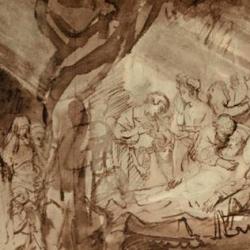Tertullian ( Against Marcion , 4.16) offers an interesting explanation of the consistency of Jesus’ teaching with that of the lex talionis :
“He who counselled that an injury should be forgotten, was still more likely to counsel the patient endurance of it. But then, when He said. ‘Vengeance is ming, and I will repay,’ He thereby teaches that patience calmly waits for the infliction of vengeance. Therefore, inasmuch as it is incredible that the same (God) should seem to require ‘a tooth for a tooth and an eye for an eye,’ in return for an injury, who forbids not only all reprisals, but even a revengeful thought or recollection of an injury, in so far does it become plain to us in what sense He required ‘an eye for an eye and a tooth for a tooth – not, indeed, for the purpose of permitting the repetition of the injury by retaliating it, which it virtually prohibited when it forbade vengeance; but for the purpose of restraining the injury in the first instance . . . .
“which it had forbidden on pain of retaliation or reciprocity; so that every man, in view of the permission to inflict a second (or retaliatory) injury, might abstain from the commission of the first (or provocative) wrong. For He knows how much more easy it is to repress violence by the prospect of retaliation, than by the promise of (indefinite) vengeance. Both results, however, it was necessary to provide, in consideration of the nature and the faith of men, that the man who believed in God might expect vengeance from God, while he who had no faith (to restrain him) might fear the laws which prescribed retaliation. This purpose of the law, which it was difficult to understand, Christ, as the Lord of the Sabbath and of the law, and of all the dispensations of the Father, both revealed and made intelligible, when He commanded that ‘the other cheek should be’ offered (to the smiter), in order that He might the more effectually extinguish all reprisals of an injury, which the law had wished to prevent by the method of retaliation, (and) which most certainly revelation had manifestly restricted, both by prohibiting the memory of the wrong, and referring the vengeance thereof to God. Thus, whatever (new provision) Christ introduced, He did it not in opposition to the law, but rather in furtherance of it, without at all impairing the prescription of the Creator.”















